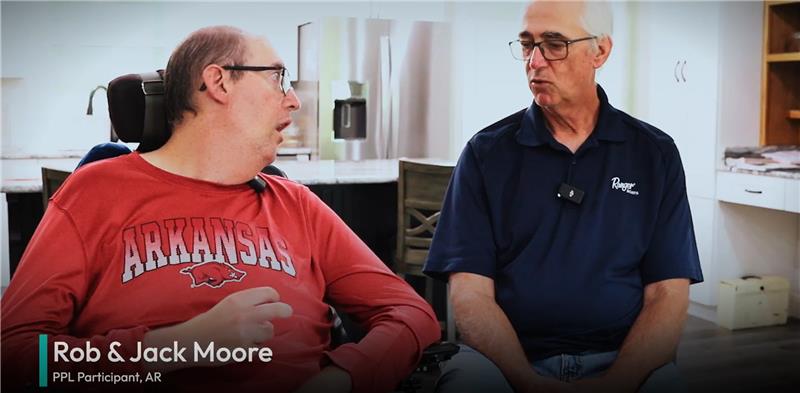Aging Adults, Self-Direction and Their Best Long-Term Care Option
By PPL on May 26, 2021

Self-direction is the best-kept secret in long-term care. Because self-direction allows Medicaid-eligible aging adults to live in their home and receive care from people they hire, such as family members or friends. This is the best way to ensure quality of life and home health care.
As a hospital discharge planner or social worker, the health and well-being of your patients is your top priority. And ultimately you understand the unique needs of your aging adult patients. It is very common for aging adults to be discharged from hospital to institutional long-term care settings.
Often because of the circumstances surrounding the discharge process, the decision-making around long-term care can be challenging. To help you and your aging adult patients, we want you to understand self-direction and how it works.
In this article we explain self-direction, how it benefits people and their families, how self-directed home care works, and how to move forward with offering self-direction. Ultimately, we want you to feel empowered to provide information about self-direction to your aging adult patients – the more they and you know about their long-term care options, the easier it is to make an informed decision.
We understand that one article barely scratches the surface in understanding self-direction, and this is why we want you to contact us with your questions. Email us to talk more about self-direction and how to get started with a referral.
What is Self-Direction?
Self-direction is a home care service model that empowers Medicaid eligible participants with the freedom of choice and control over their long-term care and support needs.
Watch Self-Direction Home Care Explained to quickly learn how self-direction helps aging adults get personalized in-home support.
Depending on where you live, self-direction might be referred to as consumer direction, participant direction or can be grouped under the heading of “self-determination” and all mean the same thing – the freedom to make choices and decisions for your daily life.
Self-directed home care is often the most effective long-term care option for aging adults. Self-direction allows people to maintain control over their support and care decisions, continue living at home, and remain independent.

Long-Term Care Options for Aging Adults
Aging adults have three long-term care options:
- Institutional care: a nursing home or assisted living facility.
- Home care agency: adult day care or home care agency.
- Self-direction: aging adults choose who delivers their support and the type of support they receive.
Use this table to understand how long-term care options compare based on services, supports, and flexibility.

“Self-direction promotes personal choice and control over the delivery of waiver and state plan services, including who provides the services and how services are provided. For example, participants are afforded the decision-making authority to recruit, hire, train and supervise the individuals who furnish their services.” (Self-Directed Services, Medicaid.gov)
10 Benefits of Self-Direction for Aging Adults
When answering questions about self-direction and long-term care options, it can be difficult to clearly explain the pros and cons of each option.
These 10 benefits of self-direction for aging adults underscore why self-direction makes sense for both quality of life and financially for your patients.
- You are in charge of your Medicaid budget and how you spend it (with some restrictions).
- You do not need to pay any agency or “hidden” fees.
- You receive personalized care from a person you know, trust, and relate to.
- You decide who comes into your home to deliver your care.
- You can adjust your support as your needs change.
- You live in your own home and community.
- You can be involved in your community – there are no limits on what you can do.
- You have control over your support and who you hire.
- You have immediate access to the care you need, regardless of where you live – city, town, village, or rural area.
- You are in control over your care.
Self-direction is for all Medicaid eligible people, including aging adults.
Please feel free to give your patients and their family members a copy of 10 Reasons Why Self-Directed Care is the Right Choice for You or Your Loved One.
How COVID-19 is Affecting Patients Across the Country
COVID-19 has left deep wounds in every community, hospital, nursing home, home care agency, and family across this country. The news headlines about the outbreaks of COVID-19 in nursing homes have been heart-breaking and eye-opening.
People quickly learned that all levels of nursing homes and assisted living facilities were struggling to control and manage the pandemic. Cost of care does not matter when it comes to the coronavirus and its deadly impacts.
Unfortunately, due to the nature of nursing homes and assisted living facilities, it is very difficult to control and prevent a COVID-19 outbreak. This forced complete lockdowns of these institutions, making it impossible for family members to visit or even communicate with their loved ones.
Couple this with the shortage of staff, the health risks for people working in nursing homes and assisted facilities, and the lack of access to protective personal equipment – we have a terrible situation that has far-reaching impacts into the community and families of anyone connected to a long-term care facility.
In fact, a recent national survey by the American Health Care Association and National Center for Assisted Living reveals that 66% of nursing homes don’t expect to remain open beyond 2021 at their current operating level. The reasons for this real-world outlook include:
- Increased operating expenses due to COVID-19.
- Limited financial relief from government.
- Changing payer mix with fewer higher-paid skilled nursing discharges from hospitals.
- Drop in consumers due to the pandemic.
These quotes from a recent Wall Street Journal article titled Covid Spurs Families to Shun Nursing Homes, a Shift That Appears Long Lasting, highlight how self-direction can help families when making decisions about long-term care:
“We implemented a complete switch of mind-set to say home is the default” for patients leaving the hospital, even frail ones, said Peter Pronovost, chief clinical transformation officer at University Hospitals, an Ohio-based system.
“Do I think that more patients will be moved to home? Absolutely. It’s the right thing to do for the patient, it’s the right thing to do for the system, and it’s the right thing to do for the cost,” said David Parker, president of ProMedica Senior Care, a major nursing-home operator that also owns a home-health-care provider and is part of ProMedica Health System.
Understanding Self-Direction in New Jersey
When explaining self-direction to your aging adult patients, it helps to understand the New Jersey Personal Preferences Program (PPP).
The New Jersey Personal Preference Program (PPP) offers an alternative way for NJ FamilyCare Plan A members who qualify for the Personal Care Assistant (PCA) services benefit to remain in their home and active in their community and does not require the use of a home health care agency.
To help you and your patients understand how PPP works, this explanation from the website highlights the key information:
“Through a monthly budget, you work with a financial consultant to develop a monthly budget, through which you decide the services you need and the individuals and/or agencies you wish to hire to provide the identified services. If you are cognitively impaired or unable to make decisions on your own, you can choose an authorized representative to assist you.
The PPP also provides fiscal management services to assist you with the financial aspects of the program. PCG Public Partnerships, LLC (PPL) is the fiscal intermediary (FI) for the PPP, and is responsible for handling payroll responsibilities, acting as a bookkeeping service, processing time sheets and issuing paychecks to your workers.
The PPP requires greater individual responsibility, but in return, offers you greater control, flexibility and choice over the services you receive.”

How Your Patients Can Enroll in Self-directed Home Care
To enroll in self-direction home care in New Jersey, the following keys to enrollment are required:
- Program Eligibility: Must have a documented need for hands-on personal care and have a doctor’s order to receive the services. The patient must have NJ FamilyCare/Medicaid Plan A and be approved by the Managed Care Organization (MCO) for PCA and PPP.
- Budget Determination: The Managed Care Organization (MCO) determines the patient’s budget based on a formula using the number of hours of care from the most recent PCA Assessment.
- Budget Flexibility: The patient’s Case Manager, also known as their Public Partnerships Financial Consultant, supports staff hiring (including family members) for assistance with activities of daily living including bathing, feeding, dressing, and grooming. A small portion of the budget may also be used for supplies to enhance independence, not covered by Medicaid.
- Patient Healthcare Security: There are strict record keeping requirements for the family. Public Partnerships LLC is the FI and is responsible for payroll, bookkeeping, and paying accurate and complete timesheets.
This diagram is a great way to explain to patients and their families how enrollment in self-direction happens:

Email us to discuss the enrollment process and how we help your patients with enroll in self-direction.
Why is Self-Direction The Best Long-Term Care Option?
Self-direction is the most affordable, flexible, easiest-to-manage, and personalized long-term care option available to aging adults.
When discussing self-direction with your patients, remember these key benefits of self-direction.
- Live in your own home and community. Always have direct access to your local support systems.
- Flexible and personalized services and care. Receive support that meets your needs, interests, and lifestyle. Self-direction gives the flexibility to adjust your services as your needs change over time.
- Creativity and freedom to be involved in your community. Self-direction means you get what you need – for example, the opportunity to volunteer in your community, attend exercise classes at your local pool, classes and seminars about your favorite hobbies and interests, etc. There are no restrictions on what a self-direction program looks and feels like.
- Personalized care from a person you know, trust, and can relate to. This can be a friend, family member, and someone who shares similar interests as you. You decide who is coming into your home to deliver your care.
- Control over your support. You do not need to rely on an agency to find, hire, and manage your care/support workers. You are the boss, which means your care/support workers answer to you.
- Improved access to care/support workers in rural areas. Because you can hire your friends or family members to deliver your care, you have immediate access to the care you need, regardless of where you live.
- Cost-effective and the best value for your money. You are in charge of your budget and how you spend it (with some restrictions). This means you can make sure you’re getting what you need and when you need it.
- Better value for your money. This translates to more support and care. With no agencies fees to pay, you have more money to allocate to your care. The average daily cost for non-medical home assistance (44 hours/week) is $66.75. The average monthly cost for non-medical home assistance (44 hours/week) is $2,002.63.
- Improved quality of life for you and your family members. Self-direction gives you and your family members peace-of-mind over your care services and support. Studies show that people using self-direction have fewer hospital stays and lower rates of nursing home use.
- Wherever you live and whatever your needs – you have control over your care. All Medicaid eligible people can use self-direction.
Self-direction gives aging adult patients freedom, flexibility, choice, and control over the essentials to living a fulfilling, safe, and happy life.
A Long-Term Care Questions Checklist
Use this checklist to evaluate long-term care options based on cost, value, services, and personal benefit.
Make sure your patients and their families ask these questions about self-direction, institutional care, and home care agencies:
- Who will be caring for and supporting me? Do I have the freedom to choose who helps me with my daily needs?
- What if my needs change? Is it easy to adjust the care and support I need.
- What happens if I don’t like the people caring for me? What if we don’t have anything in common?
- What do the monthly and daily fees cover? How much of this money is paid to my care/support worker?
- Can I be involved in my community and easily visit with friends and family members?
- How will I be cared for if there is a pandemic? How will my care and support be impacted?
- How many people is each care/support worker responsible for? How many hours of care will I receive each day?
- What is my Medicaid budget spent on? Do I have any control over how my Medicaid budget is used?
- Can I talk to other people who use this type of long-term care? (Meet three people and families who use self-directed care – Tanya Teglo, Peggy & Virginia, and Osmel & Sergio Martinez.)
Above all else, patients and their families should never feel pressured or rushed into making a long-term care decision.
We are here to help you, your patients, and their families in making a long-term care decision that fits their unique needs. Email us to talk more about self-direction.
Q & A with Donna Schierman, Director Aging Adults Community Options

Q: What do you want people to know about self-direction?
A: Donna: Self-direction is the best kept secret in long-term care, and it allows you to be safe in your home and within your community. It offers open ended flexibility, allowing you to continue live in your community and manage the program to suit your needs.
Because you control your budget, you get more from your budget. You can choose your caregiver and the time-of-day flexibility to meet your needs. Your ability to choose your family members as your caregiver is very powerful.
The individual is empowered in this program to make their own decisions (to be your own boss). It allows for self-direction which is very meaningful to this community.
Q: What things should people consider when making a long-term care decision?
A: Donna: Ask yourself some key questions including:
- What are your true needs?
- How can you make the most out of your budget?
- Who do you want to care for you?
- When should you start thinking about these decisions and planning for it?
Q: What are you hearing from people about their self-directed care experience?
A: Donna: It’s very rewarding to hear such positive feedback from people who are benefiting from self-directed care. Multiple times a week I receive phone calls and emails with self-direction testimonials:
“There is nothing like being cared for by someone you know and trust. The flexibility is something that is not offered in any other long-term care programs.”
“During COVID I felt safe home with family being cared for by family. Thankful for this option and that I did not have to go into institutional care.”
Q: What key questions do you want people to ask when considering their long-term care options?
A: Donna: It’s super critical that people do ask questions when reviewing their long-term care options. In fact, the more questions – the better! I want people to always ask these essential questions about long-term care:
- How does the program work?
- What are the requirements?
- What is the cost?
- What are the benefits?
- What is the timeline for enrollment and how do I enroll?
- How do I apply for Medicaid if I don’t have it?
- What does it mean to be an employer?
Q: How can hospitals help with long-term care decisions?
A: Donna: Hospital staff are trusted knowledgeable people who can offer options and direct individuals and families to care where they will be safe and cared for based on their needs. Experienced hospital staff know how to evaluate current care needs and plan for future care needs.
Because many aging adults and their families trust and respect hospital staff, their advice about long-term care can be life-changing for people.
To learn more about self-direction, email us. We can arrange a virtual or in-person presentation to answer your questions and those of your colleagues.



